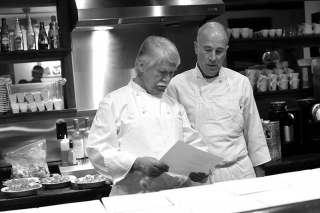
What Does It Mean to be a Teacher?
31 May 2019As teachers we must understand the role of the educator is not to direct as much as it is to draw forth.
By Paul Sorgule, MS, AAC
As chefs, where most culinary instructors start out, there are tangible rewards that exist every day. We produce a product that can be enjoyed by the recipient in many sensual ways: sight, smell, touch, taste, and even sound. As chefs we are, to a large extent, totally in control of our environments and able to make decisions in the moment without too much interference from internal or external forces. As chefs we have the ability to select who will work for us, what their skill set might be, and evaluate their longevity with a restaurant based on measured results. We build the team we want and need and then set the stage for them to perform.
Teaching is different in many ways, but similar in others. That transition from being an operations chef to becoming a teacher is monumental, and to some, very difficult to accept. We still have tangible rewards, but they are not our own – they are the reward in seeing the light bulb go off; the look of acknowledgement from a student when they get it; the products students produce using the right technique of building flavor and appearance; and that call from an alumnus just to let you know they received a promotion to sous chef.
There is still the product, but now we must relinquish our complete control over it and respect that students will make many mistakes along the way. We must understand that those mistakes are teaching moments and that we cannot be critical without demonstrating how to improve. We must learn the difference between criticism and critique. We must learn to be patient with decision making because nothing comes easy in an educational environment – the most vivid example of a democracy with all of its faults. And, maybe for the first time, we must realize that just like your family – you cannot choose who will be a member. You will be faced with a different cohort every few weeks – a cohort with different skills, abilities, attitudes, and expectations that will test your patience and your leadership. You cannot fire a student, nor should that ever be the fallback objective. What you can do is take the time to help each student relate to standards, begin to understand, learn to work with others, and grow.
Being a chef instructor requires you never forget what it is like to operate under the pressure of a busy kitchen, never relinquish the responsibility for quality, never sacrifice strong beliefs for acceptance, and never allow a teaching moment to pass you by without action.
For those who have made the transition I know you will agree that teaching is as difficult, as challenging, as intense and demanding of every skill and experience that you have accumulated, as is running a multi-million-dollar restaurant. It is different, yet it is the same. Each position has objectives, each demands a breadth of knowledge that can be relied on, each requires the ability to think fast and problem solve, and each requires the individual to be the example for others to follow.
As teachers, we must understand the role of the educator is not to direct as much as it is to draw forth. In fact, the definition of education is pulled from the Latin word “EDUCO” which means to draw forth. We must engage the student so real learning takes place and they contribute something of themselves to the process rather than simply try to absorb what you have to offer. Most chefs who are now teachers will state that they learn as much, if not more, each day from their students than they could ever imagine offering to them.
There will come a point in time when you will pause and acknowledge that you are a teacher first. You will never relinquish your chef persona, but you have evolved. Your product to hold and admire is the student that you helped, the person to whom you gave direction, and the person who will pass it on and make a difference along the way.
Teach your students by example. Teach them what it means to be dependable, trustworthy, honest, accepting, inclusive, principled, hardworking, and kind. Do this along with helping them build those skills of a cook. Provide them with experiences that change their lives and situations and test their abilities. Nurture their passion for food, but at the same time show them what it means to stand up for what they believe in. This is what it means to be a teacher.
Be proud of who you are – a teacher, mentor and guide. Teachers make a difference.
PLAN BETTER – TRAIN HARDER
Paul Sorgule, MS, AAC, president of Harvest America Ventures, a mobile restaurant incubator based in Saranac Lake, N.Y., is the former vice president of New England Culinary Institute and a former dean at Paul Smith’s College. Contact him at This email address is being protected from spambots. You need JavaScript enabled to view it..
